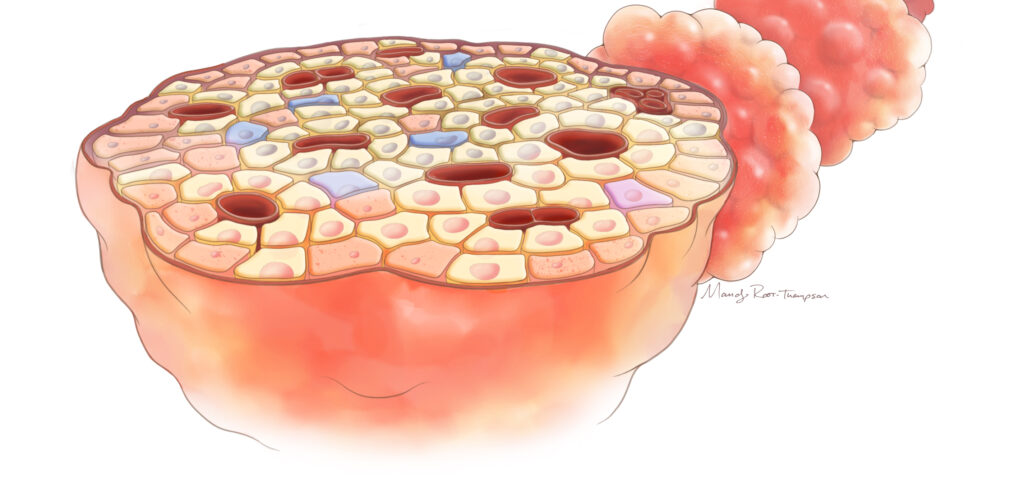The Endocrinologists’ Role in Caring for TPIAT Patients
The Endocrinologists’ Role in Caring for TPIAT Patients https://pediatricsnationwide.org/wp-content/uploads/2022/09/Fall-22-Cover-Flattened-HEADER-FOR-WEB-1024x500.jpg 1024 500 Lauren Dembeck Lauren Dembeck https://pediatricsnationwide.org/wp-content/uploads/2021/03/Dembeck_headshot.gif- February 12, 2024
- Lauren Dembeck

Children with recurrent acute or chronic pancreatitis often suffer debilitating pain and may endure an impaired quality of life. They may be frequently admitted to the hospital, disrupting their daily routines and activities. Patients may undergo medical and endoscopic interventions for both diagnostic and therapeutic purposes and may be offered surgical interventions.
Total pancreatectomy with islet autotransplantation (TPIAT) can be an effective therapy for patients who are refractory to standard medical and endoscopic interventions and cannot undergo conventional surgical options. Along with other components, the procedure involves complete removal of the pancreas followed by the isolation of the pancreas’ insulin-producing islets, which are then infused into the patient’s liver (and other locations as needed), where they can potentially engraft and continue functioning.
Nationwide Children’s Hospital is one of the few institutions in the country offering TPIAT to pediatric patients in need of complex pancreatic care. The procedure requires a multidisciplinary team that includes pancreatitis and pancreatic surgery specialists, gastroenterologists, psychologists, social workers, pain specialists, infectious disease specialists, islet biologists, and endocrinologists. Given the central focus of islet preservation for the procedure, endocrinologists play a pivotal role in pre- and post-operative care of patients undergoing TPIAT and its outcomes.
“TPIAT is one of the very few instances in which we can predict the date of diabetes onset,” explains Jennifer Ladd, MD, MSc, pediatric endocrinologist and co-director of the TPIAT Endocrinology Program at Nationwide Children’s. “This is a unique situation that allows us to better plan for our patients to achieve optimal outcomes and promote islet survival.”
The primary goal of TPIAT is to improve quality of life for these children who have a paucity of treatment options, by decreasing their pain and use of opiates and allowing for return to school or work. All patients will be insulin dependent immediately after TPIAT to allow for islet recovery, but the long-term goal from an endocrine perspective is to safely discontinue exogenous insulin. When being evaluated for TPIAT, patients and their families meet preoperatively with an endocrinologist to discuss the procedure and its impact on islet function and to provide education on diabetes management.
“Postoperatively, all patients after TPIAT will have diabetes and will need to monitor their blood sugars and receive intensive insulin therapy. Strict glycemic management is critical to support optimal islet function, with the long-term goal of independence from exogenous insulin. Thus, preoperatively, our team meets with patients and their families to introduce technology-based diabetes management and factors impacting postsurgical diabetes outcomes,” adds Dr. Ladd.
Once a patient has been deemed a candidate for TPIAT, they will then undergo intensive diabetes education over a series of in-depth visits. At these appointments, the patient and their family receive comprehensive training on continuous glucose monitoring and insulin pump technology as well as lifestyle changes that will be necessary following the surgery.
“We are very fortunate to have excellent support from our wonderful TPIAT medical team, diabetes nurse educators and dietician team that focuses on diabetes education, carbohydrate counting and optimal nutrition, and an advanced practitioner team that helps us with the inpatient and post-operative long-term diabetes management,” shares Kajal Gandhi, DO, MPH, co-director of the TPIAT Endocrinology Program at Nationwide Children’s. “There are so many medical teams involved — it’s not as simple as just having a surgery. We make sure we guide the families from start to finish. Our hope and goal is that our patients have a better quality of life, and that makes a huge difference in the child’s development.”
Image credit: Nationwide Children’s
About the author
Lauren Dembeck, PhD, is a freelance science and medical writer based in New York City. She completed her BS in biology and BA in foreign languages at West Virginia University. Dr. Dembeck studied the genetic basis of natural variation in complex traits for her doctorate in genetics at North Carolina State University. She then conducted postdoctoral research on the formation and regulation of neuronal circuits at the Okinawa Institute of Science and Technology in Japan.
-
Lauren Dembeckhttps://pediatricsnationwide.org/author/lauren-dembeck/
-
Lauren Dembeckhttps://pediatricsnationwide.org/author/lauren-dembeck/
-
Lauren Dembeckhttps://pediatricsnationwide.org/author/lauren-dembeck/
-
Lauren Dembeckhttps://pediatricsnationwide.org/author/lauren-dembeck/January 29, 2019
- Post Tags:
- Endocrinology
- Pancreas
- TPIAT









